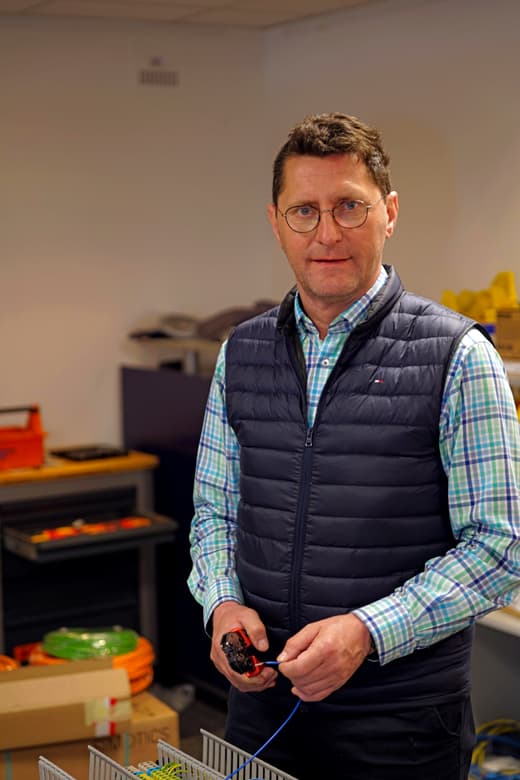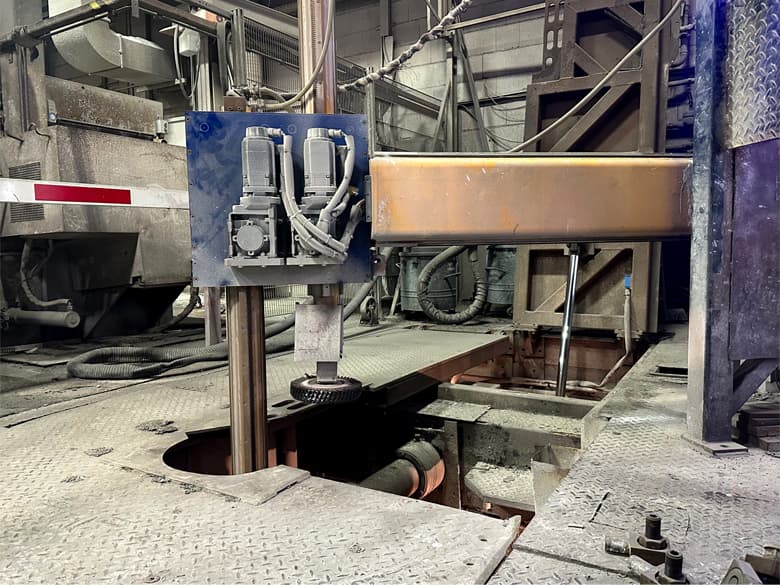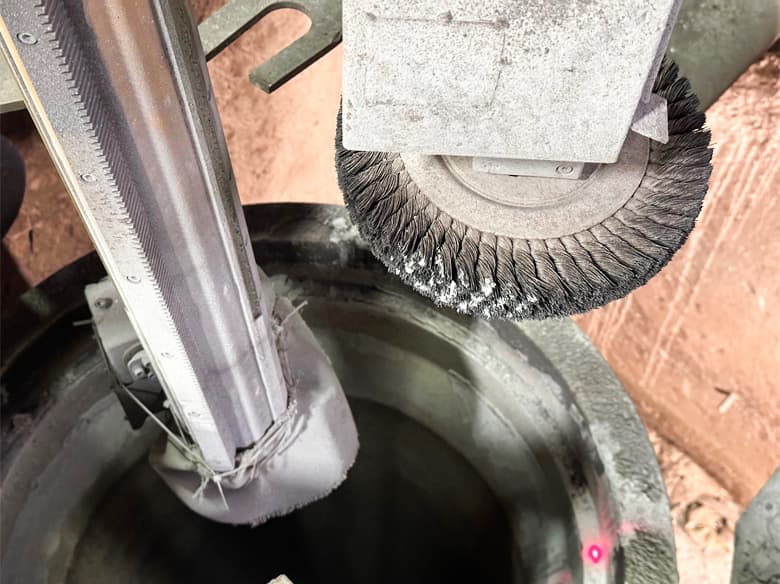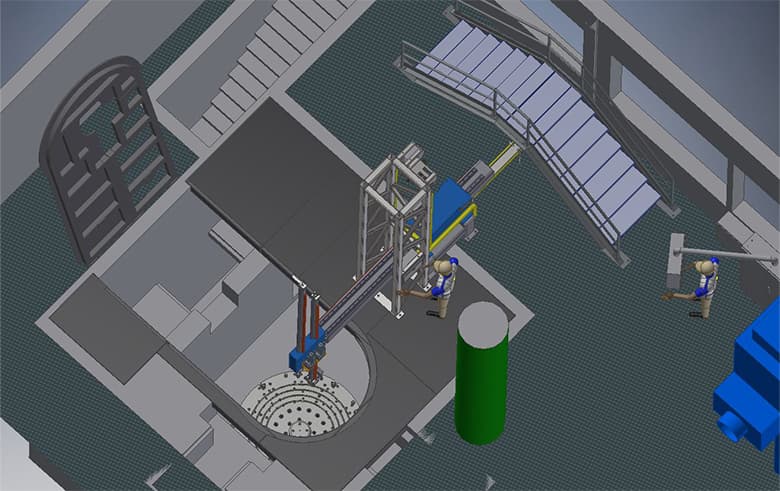The “manufactory” for special cases
Kuhn Innovation: automating for more efficiency and sustainability Continue reading
By: Michael Vehreschild
Automatically successful – this is a formula for success from the point of view of Kuhn Innovation GmbH. Therefore, the company from Radevormwald wants an automation boost to go through the foundries so that they can continue to operate competitively in Europe in the future. After all, challenges such as a shortage of skilled workers, energy efficiency, occupational safety and quality are challenging the entire industry. That is why Kuhn Innovation, founded as an independent company just over two years ago, wants to accelerate automation and digitisation – at Kuhn Industrie Holding’s own foundries, but also at external companies.
Like many others, the foundries of the companies Kuhn Special Steel and M. Jürgensen, which, like Kuhn Innovation, belong to Kuhn Industrie Holding, are undergoing a transformation. In order to cope with this in the best possible way, Kuhn Innovation was founded in 2020. The previously separate design departments of the two companies were merged there.
“The aim was to bundle the capacities available at both locations and to create a form of organisation that supplies both locations with automation and thus gains a synergy effect,” explains Alfred Tenner, Managing Director of Kuhn Innovation.
 Alfred Tenner, Managing Director of Kuhn Innovation GmbH.
Alfred Tenner, Managing Director of Kuhn Innovation GmbH.Automation also for external foundries
Several casting machines at the group’s own sites have already been partially automated. This ranges from small extensions to the development of new facilities in the foundries, but also in the connected stock removal operations. Other projects envisage continued automation of the foundries. “The reasons for this are the improvement of working conditions, better and more consistent quality and better energy efficiency in the entire production,” emphasises Alfred Tenner. Challenges that other foundries are also facing.
It is therefore somewhat remarkable that Kuhn Innovation also offers its services – such as consulting, design, electrics, and software – for automation to external foundries, which the company rates as the most important user industry next to the steel industry. Kuhn Innovation values the benefits more highly than the danger to its own company. In addition, the centrifugal casting sector represents somewhat of a niche. The strengthening of competitors is something “we want to and will avoid. We are not fixated on foundries here”. Because the customers also include companies from the fields of mechanical and plant engineering and robotics.
The policy to make other companies fit for competition began in the summer of 2021 and is currently being intensified. Initial talks with external foundries took place in August 2021. The company wants to build up another foothold through the external business, which is currently still under development.
Increased quality and greater efficiency
The Managing Director of Kuhn Innovation sees further advantages of automation: in this way, the use of base and auxiliary materials can also be reduced. By increasing the quality, there will be less waste – and it does not have to be melted down again and cast and manufactured anew. “This fact and the saving on auxiliary materials helps to reduce energy consumption,” emphasises Alfred Tenner. Especially valuable in times when energy costs keep climbing. Therefore, it is also important to pinpoint and evaluate consumptions and losses using sensor technology. For example, in the fields of electrical engineering, compressed air and gas.
 An improvement of the working conditions is possible thanks to automation (here a lance moving into the vertical gravity die).
An improvement of the working conditions is possible thanks to automation (here a lance moving into the vertical gravity die).
Ultimately, from the point of view of the Managing Director, increased automation is also an asset for attracting skilled workers. For instance, partitions and extraction systems mean less dust and noise. Physically hard and monotonous work is taken over by automation. The foundry workers are less exposed to heat and dust. Occupational safety is increased.
 The lances are equipped with various tools and sensors.
The lances are equipped with various tools and sensors.
Digital evaluation instead of working with paper
Digitisation is inseparable from automation, which Kuhn Innovation is also pushing. The target data is given to the machines and employees in digital form. “This also includes setting up the necessary interfaces as well as an ergonomic display and operability,” stresses Alfred Tenner. The actual data from the process is recorded digitally – “no operator should have to write down data on pieces of paper and only have to enter data at the operating terminal in individual cases”. The aim here is to install suitable sensors or methods for recording all data. The data is transferred to a central database. “The data can then be evaluated, visualised or, using algorithms, target specifications can be generated for future orders. We are supported by our partner, the company ASINCO, in the application of new sensors and also the evaluation of the data.”
And the last word in terms of digitisation is – of course – far from being pronounced. Alfred Tenner: “This development is indispensable for our future success. We want to strengthen our field of work especially in the area of data processing and evaluation, but without neglecting the expertise at the field level.“
 Vertical machine with linear robot.
Vertical machine with linear robot.
Linear robots as an important part of automation
A main component of automation are linear robots, which, according to Managing Director Alfred Tenner, are resistant to dust and heat and easy to maintain. The linear robots are used for the preparation of the gravity dies – cleaning, dressing, inspecting – and for the introduction of additives after casting. Also part of the automation is measurement technology for recording temperatures and levels. As a result, a constant quality is achieved as well as an increase in occupational safety.
The linear robots have three to five servo-controlled axes that take over physically difficult tasks from employees. The axes move at about five m/min, whereby the special features are not the speed, but the robustness in the casting process and the option of being gradually expanded by further functions. For example, some processes run in preheated gravity dies at 400°C for a period of several minutes and after casting for a few seconds at well over 1,000°C.
Further innovations planned
In addition to further automation and digitisation projects, Kuhn Innovation supports foundries on their way to climate-neutral production. “Our four pillars are based on this: automation, digitisation, energy efficiency and machine safety, which we also implement in external projects.“
Through automation, work steps are always carried out consistently in the same way. As a result and through the targeted recording of parameters – such as temperatures, pressures and coating thickness measurements – the production process can be influenced directly, the quality of the products increases and becomes more uniform. Efficiency, throughput and throughput times would be optimised. Production errors are detected promptly and countermeasures are taken immediately.
Powerful team
In order to create innovative concepts, in Alfred Tenner’s view it is advantageous to work as a rather small team of eight employees and to act on the market independently from the Kuhn Group. The agile way of working, promoting and demanding new ideas, trying out a lot of things, no idea is off the table – this gives employees the necessary freedom for innovation. The employees feel like a startup with a history in a medium-sized company – with a lot of room for flexibility.
And it is precisely this manoeuvrability – combined with expertise – that is necessary in order to offer tailor-made solutions. “We do not see ourselves as a ‘mass supplier’, but as a small ‘manufactory for special cases’.“ Initially, however, the predominant share – about two thirds – will continue to be made up by the internal business. The basis for this seems to have been laid – in any case, Kuhn Innovation is more than satisfied with the start as a subsidiary of Kuhn Industrie Holding, which provides motivation for the future.
– The German version of this text was published in the GIESSEREI (FOUNDRY) in March 2023. –
Headerimage: © ASINCO GmbH – Several casting machines at our own sites have already been partially automated. Pictured, the camera moving into a horizontal gravity die.
Further Photos: © Kuhn Innovation GmbH

